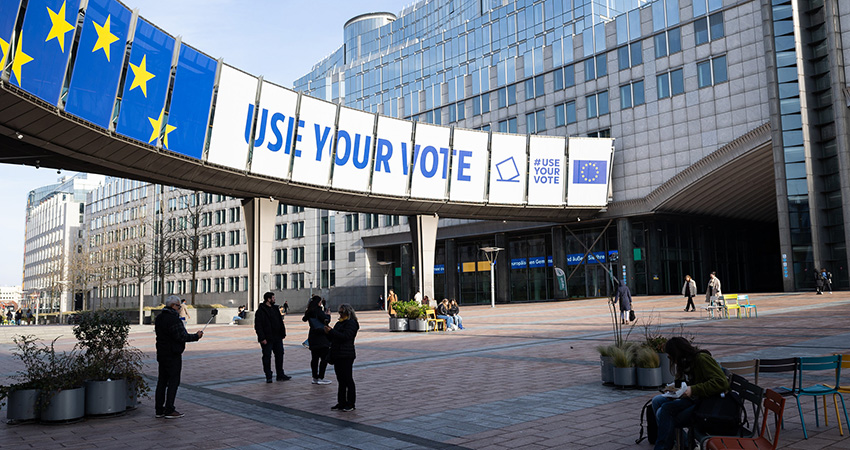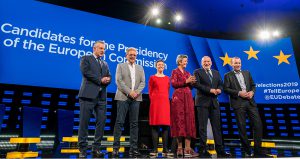European elections: What is there to choose for water professionals?

-
 Esther Rasenberg
Esther Rasenberg
Share article:
From 6 to 9 June Europe is voting for a new European Parliament. For water professionals these are important elections because new water legislation and regulations is mostly made in Europe. A vote for Members of the European Parliament can have direct consequences for their daily practice. Water News Europe offers an overview of what choices water professionals can make.
Recently 35 Members of the European Parliament (MEP’s) and a representative of the European Economic and Social Committee (EESC) sent an urgent letter to the European Heads of State and Government to make water a top priority in the European Union. According to them ‘this strategy will be crucial to protect valuable resources for present and future generations, the environment and industries’.
Water is not a political priority
Despite this request European political parties do not mention water issues as a top priority. The availability of water, water quality, flood resilience and environmental issues linked to food production are mentioned in some of the party programmes, but without priority.
Water Resilience initiative postponed
In the run-up to the European elections the European Commission took the Water Resilience initiative off its agenda. This initiative is the EU response to climate change driven droughts and flooding. It aims to ensure access to water for citizens, nature and the economy, while also tackling catastrophic flooding and water shortages. The news to ‘pause’ the initiative for water resilience before the elections was met with disbelief and concern by many sectors. Behind the scenes it was said this decision was the result of the farmers protests.
New water legislation
Over the last years water legislation has been renewed. A new and stricter Drinking Water Directive was adopted and a Water Reuse Directive was introduced. In the European Parliament there are no national parties, only European parties. These European parties are composed on the basis of ideas and values of national parties from the 27 different Member States. A vote for a national party is in fact a vote for one of these European parties. In every member state parties are participating in the European elections. Based on the number of inhabitants every country supplies a part of the 720 available seats.
European Committees
There is no specific European Committee responsible for all water issues. Several of in the total 22 committees are dealing with different aspects of the topic. The most important committees are ‘Environment, Public Health and Food safety’, ‘Industry, research and energy’, ‘Internal market and Consumer protection’ and ‘Agriculture and rural development’. The main issues are divided among these committees. Think of the Water Framework Directive, the Drinking Water Directive, The Urban Wastewater Treatment Directive, Wastewater Reuse Directive, REACH, the use of biocides and pesticides like glyphosate, privatisation of drinking water companies and agricultural matters.
MEP Water Group
In the European Parliament a MEP Water Group is active. This group has five members; Ulrike Müller (Renew, Germany), Bernd Lange (S&D, Germany), Vondra Alexandr (ECR, Czech Republic), Ciarán Cuffe (Greens) and Chair Pernille Weiss (EPP, Denmark). The last years this MEP Water group worked hard to raise the profile of water as a cross-cutting topic in EU decision-making. They also want to make sure that Europe’s water resources are managed in a sustainable way. Water has to benefit the European economy and society as a whole, fostering the value of water and a water-smart society in Europe. The MEP Water Group listens to the concerns and priorities of the water sector, as reflected at a European level. It helps placing water higher on the European political agenda and shaping the future EU Water policy.
Political differences
According to their political preferences European parliamentarians will influence existing and upcoming Water Directives. Water News Europe investigated the political programmes and found out what water professionals expect from the different parties.
EPP defends farmers
The European People’s Party (EPP) is a gathering of conventional, national parties. The EPP supports European farmers and rural communities and they defend their interests. EPP believes that science-based decisionmaking, enabling the use of new technology, offers far better pathways to a more sustainable agricultural sector than purely ideological approaches. Allowing the use of New Breeding Techniques (NBTs) in the EU, for example, will not only enable farmers to produce crops requiring less inputs, such as water, fertiliser and pesticides, but it will also mean RD&I investment and jobs across Europe. The EPP group advocated the renewal of glyphosate in October 2023.
Renew Europe for recycling water
Renew Europe is a gathering of pro-European parties like the Alliance of Liberals and Democrats (ALDE) a priority to renew he European Union. The EU has the chance to renew itself and be able to deliver on the bigger issues. They state we need to take responsibility where others are doubting the ecological imperative. Because the reinvention of Europe will only make sense if future generations can live in a preserved environment and successfully make the transition towards sustainable and circular use of our finite resources. For Renew Europe the ecological imperative goes hand in hand with delivering economic prosperity. They are mutually inclusive.
The Greens for nature restoration
The Greens advocate for rules promoting strong pesticide reduction and integrated pest management, crucial for safeguarding biodiversity, pollinators, water quality, public health, and farmers’ well-being, in alignment with the EU Farm-to-Fork strategy and the Green Deal. They also want to protect European farmers from unfair competition with third countries, where the use of synthetic pesticides are still allowed. No crop produced with the use of chemical pesticides that are banned in the EU should be allowed in the EU market. They also call on public authorities to ban the export of chemical pesticides that are banned on EU soil.
ECR Group for waste limits
The European Conservatives and Reformists Group is a centre-right political group in the European Parliament. According to this group the European Union has overreached. ‘It has become too centralised, too ambitious, and too out of touch with ordinary citizens. Regarding the revision of the Waste Framework Directive (WFD). This targeted revision seeks to expand the directive’s scope to encompass provisions related to both food and textile waste. The revision will set initial targets to reduce food waste in processing, manufacturing, retail, restaurants, and households. The ECR Group sees the WFD as a step in the right direction to limiting food and textile waste’, says their campaign.
ID Group against unattainable nature goals
The Identity and Democracy Group (ID Group) is an alliance of nationalist, right-wing populist and eurosceptic European political parties. According to them the practical implementation of nature restoration has proved disastrous. Ambition has turned into wishful thinking and pragmatism has been replaced by an ideology that has produced unattainable rules and goals. These goals come with very high costs in economic terms, sustained entirely by European citizens.
The Left for strict control on toxic chemicals
The Left state time is running out for strong measures to save the planet and deal with the massive challenge of climate change. The fight for sustainable and just environmental, agriculture and fisheries policies means protecting nature, standing up for small rural and coastal communities and pushing for strict controls on toxic chemicals.















